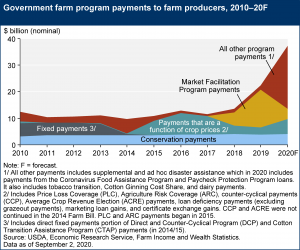House Agriculture Chair G.T. Thompson has tentatively scheduled a farm bill markup for the week of Feb. 23, according to three people familiar with the plans.
After Resolving a Fight Over Farm Payments, House Passes Continuing Resolution
David Lerman and Jennifer Shutt reported on Tuesday night at Roll Call Online that, “The House swiftly passed a stopgap funding measure needed to avert a partial government shutdown in eight days after top congressional leaders reached a deal resolving a fight over farm payments.
From those who grow our food to those who need increased access to it, the agreement reached tonight ensures that both American farmers and families will have the support they need as we continue to navigate COVID-19.https://t.co/Bkct30WBBj
— Rep. Cheri Bustos (@RepCheri) September 23, 2020
“On a lopsided vote of 359-57, the House sent to the Senate a revised continuing resolution that would extend current funding for all federal agencies through Dec. 11.
“The bipartisan pact would restore money for farm payments sought by lawmakers from both parties that House leaders had rejected in an earlier stopgap measure introduced Monday. It also would restore new money for a pandemic-related program funding subsidized meals to children who would normally receive them when schools are open, among other nutrition assistance, Democrats said.”
Our producers rely on the safety net provided in the Farm Bill, and today’s agreement to reimburse the CCC ensures that USDA can provided these programs without delay or interruption to our farmers & ranchers. https://t.co/6pokgkD6F9
— Senator John Hoeven (@SenJohnHoeven) September 22, 2020
The Roll Call article pointed out that, “The agreement also contains language [Speaker Nancy Pelosi] said would prevent ‘funds for farmers from being misused for a Big Oil bailout,’ after earlier reports surfaced that the administration has been planning to divert Commodity Credit Corporation funds to refiners.
“‘The last thing the United States needs right now, in the midst of a pandemic, is a lapse in government funding that was set to expire at the end of this month,’ Rep. Rodney Davis, R-Ill., said during floor debate.”
BIG NEWS: After pushing congressional leaders to not leave Iowa’s family farmers out of a vital funding resolution – I’m pleased to share that the House has gone back and added this aid AND a provision to make sure farm payments don’t end up in the pockets of Big Oil! #IA03 https://t.co/3y04wKKPOf
— Rep. Cindy Axne (@RepCindyAxne) September 22, 2020
Wall Street Journal writers Kristina Peterson and Lindsay Wise reported in Wednesday’s paper that, “The bipartisan agreement between House Speaker Nancy Pelosi (D., Calif.) and Treasury Secretary Steven Mnuchin, reached just hours before the vote, is expected to smooth the bill’s passage in the GOP-controlled Senate and avert a partial shutdown when the government’s funding expires next Thursday.”
The Journal article explained that, “The agreement between Mrs. Pelosi (D., Calif.) and Mr. Mnuchin would add to the spending bill $21 billion sought by the White House for the Commodity Credit Corp., or CCC, a Depression-era program designed to stabilize farm incomes that permits borrowing as much as $30 billion from the Treasury to finance its activities. The agreement prohibits any payments from going to fossil fuel refiners and importers, a concern of Democrats, and includes roughly $8 billion in additional nutrition funding.”
Support for family farmers and hunger programs should never be in contention. I’m proud that we were able to push leadership and secure a bipartisan deal that helps hardworking Minnesotans and improves accountability of taxpayer dollars. https://t.co/jcV1LAf7w4
— Angie Craig (@RepAngieCraig) September 23, 2020
“President Trump has tapped the CCC program to finance both trade relief and coronavirus-related aid for farmers, a second round of which he announced at a campaign rally in Wisconsin last week. But the program has traditionally been used to send out payments established under bipartisan farm bills, some of which the Agriculture Department had said could be subject to delays as soon as October.”
Peterson and Wise noted that, “Tuesday night’s deal ended an intensifying partisan battle over the farm aid. Democrats and Republicans had in their assessment of whether the CCC program would need to be shored up early. The program’s annual replenishment typically takes place in November or December after the CCC submits financial forms and is audited, according to the Congressional Research Service.






